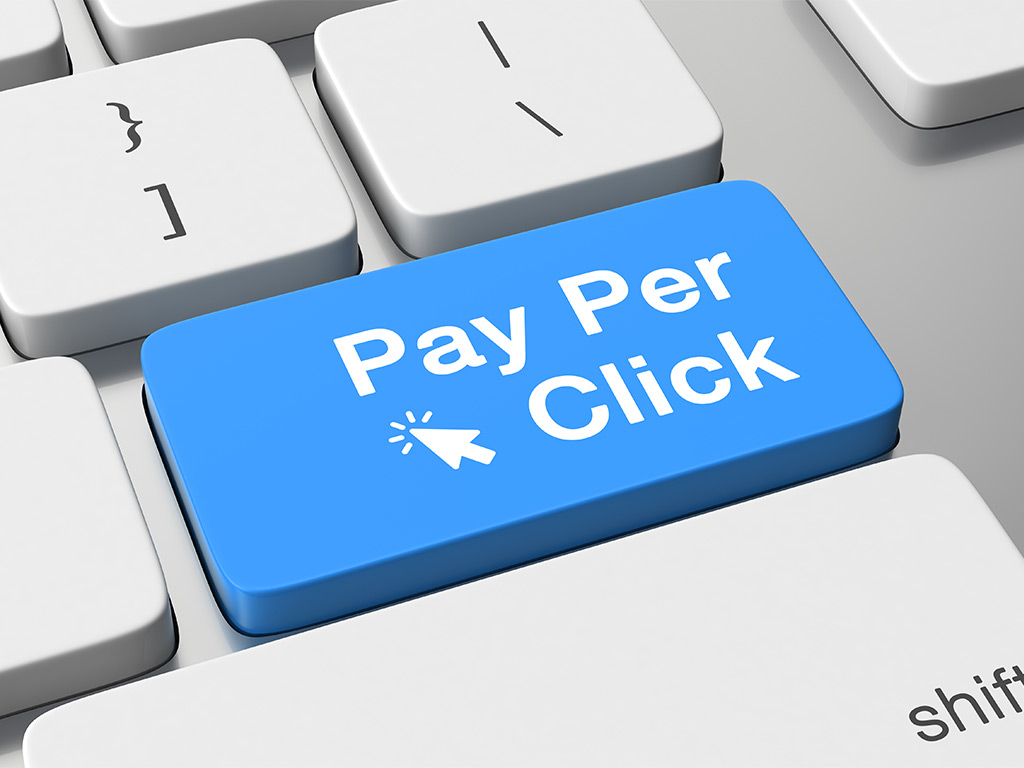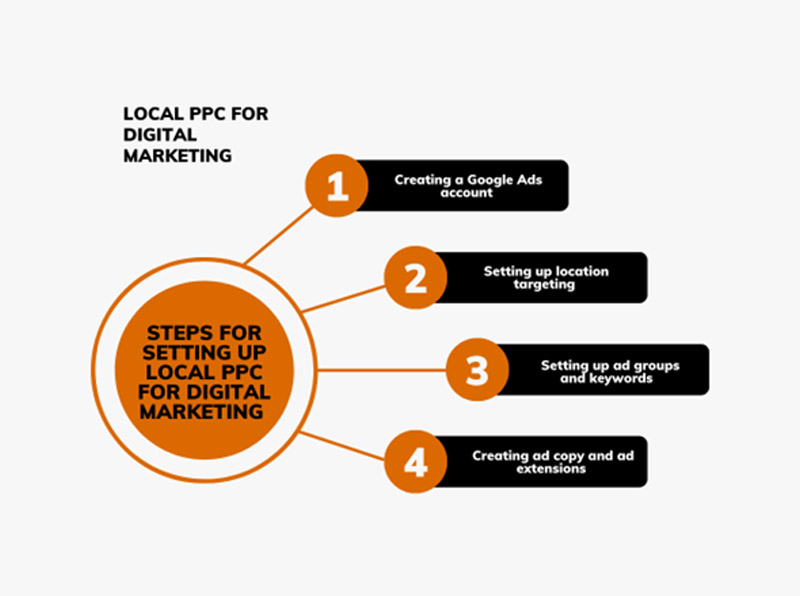Navigating Local PPC for Digital Marketing

Introduction
Running a local business makes it hard to reach the right audience. PPC (Pay Per Click) for digital marketing helps you show up in front of the right audience, get higher conversions, and increase brand awareness. Along with this, with local PPC advertising, you are in control of your campaigns, making it easier to track the campaigns and giving you flexibility in the options.
Local PPC is a type of digital advertising allowing businesses to show their ads to potential customers in specific locations. It is a targeted marketing strategy enabling businesses to reach customers in specific geographies and driving traffic to their website or physical location.
With local PPC advertising, businesses bid on specific keywords and phrases related to their products and services and include location-based terms such as city names, zip codes, and neighborhood names. When users search for these keywords, the company’s ads show up at the top of search engine results pages and other related ads.
Local PPC is a highly effective digital marketing strategy for businesses that want to reach customers in specific locations. It helps companies to increase their online presence, drive higher targeted traffic to their websites and physical locations, and ultimately increase sales and revenue.
Setting Up Local PPC for Digital Marketing
Creating a Google Ads account
The first step in setting up local digital marketing PPC is creating a Google Ads account. If you already have a Google account, you can use it to sign up for Google Ads. It helps you with tailor-made ads according to your needs. You just need to feed your desired goals, creating customized ads.
If you don’t have a Google account, you must create one first. Once you have a Google account, you can sign into Google Ads and set up your campaigns.
Setting up location targeting
The next step is to set up location targeting. This allows you to choose the geographic areas where you want your ads to appear. This is a significant step in setting up the local PPC for digital marketing. Your target customers can only find you if you have mentioned the location precisely. In case you forget to do that. Not only will you get customers you would be unable to serve (dead leads), but you will also miss out on potential customers.
You can target by country, state, city, or even by specific radius around a location. Choosing the right locations based on your business goals and target audience is essential.
Setting up ad groups and keywords
After location targeting, you must set up your ad groups and keywords. Ad groups help you to organize your ads and target specific themes or products. They are words that share a similar target. Keywords are the words or phrases that trigger your ads to appear in search results. You should choose keywords that are relevant to your business and target audience.
For instance, the target audience of ad group desserts is related to various keywords like cupcakes, ice cream, chocolate, and cookies. This tells the search engines to only show ads for these products on related websites.
Creating ad copy and ad extensions
Once you’ve set up your ad groups and keywords, you must create ad copy and extensions. Ad copy is the text that appears in your ads and should be compelling and relevant to your target audience. Ad extensions provide additional information about your business, such as your phone number, location, or links to specific pages on your website. Ensure your ad copy and extensions are consistent with your business goals and target audience.
Setting up local PPC for digital marketing requires careful planning and attention to detail. By following these steps, you can create effective campaigns that reach the right audience and drive conversions for your business.
Optimizing Local PPC for Digital Marketing Campaigns
Monitoring performance and making adjustments
One of the keys to optimizing local PPC campaigns is to monitor their performance regularly and make adjustments as necessary. This can involve analyzing metrics such as click-through rates, conversion rates, and cost per click to identify areas where you can improve. For example, if specific keywords are not performing well, you may want to adjust your bids or remove them altogether. On the other hand, if you see that certain ads or ad groups are performing exceptionally well, you may want to allocate more budget towards them.
Using location-specific ad copy
Another effective strategy for optimizing local PPC campaigns is location-specific ad copy. This can involve referencing local landmarks, events, or other elements specific to your target area.
For example, if you target a specific city, you could reference a local festival or attraction in your ad copy. This can make your ads more relevant and engaging to your target audience.
Bidding strategies for local PPC
When it comes to bidding strategies for local PPC, there are a few different options to consider. One approach is to use bid modifiers to adjust your bids based on your target location. For example, you may want to bid higher for keywords in a highly competitive market or lower for keywords in a less competitive market.
Another approach is to use automated bidding strategies, such as Target CPA or Target ROAS, which can help to optimize your bids based on your campaign goals.
Ad scheduling and geo-fencing
Ad scheduling and geo-fencing can also be effective strategies for optimizing local PPC campaigns. TheAd scheduling involves setting specific times or days of the week when your ads will appear based on when your target audience is most likely to be searching. Geo-fencing consists in setting up a virtual boundary around a specific location, such as a store or event venue, and targeting ads to users within that boundary. This can be particularly effective for driving foot traffic and sales for local businesses.
Common Local PPC Mistakes to Avoid
Over-targeting or under-targeting
Over-targeting occurs when you narrow your audience too much. It leads to fewer clicks and conversions. For example, you only target a specific zip code. In that case, you may miss out on potential customers who live nearby but outside that zip code. On the other hand, under-targeting occurs when your targeting is too broad, resulting in clicks and impressions from uninterested users. For instance, if you’re a local bakery and your ads are being shown to people outside your delivery range, you’re likely wasting your advertising budget.
For this reason, it is necessary to correctly niche down on your target audience to save your PPC from falling flat. If that is in place, your ads will appear when your target audience seeks your services.
Neglecting mobile optimization
Mobile devices account for a significant portion of online searches. If your ads are not optimized for mobile, you could miss out on many potential customers. Neglecting mobile optimization could result in slow page load times, unresponsive pages, and a frustrating user experience for your mobile users.
Additionally, Google penalizes ads that are not mobile-friendly by ranking them lower on search results.
Ignoring Branded Keywords
Another common mistake is not bidding on high-performing keywords. Many argue it’s not worth it or necessary since they already rank organically for those terms. However, even if you don’t use them, your competitors can easily outbid you and steal away potential customers searching for your brand.
Branded keywords are search terms that include your brand name, product name, or any other branded terms related to your business. These keywords have a high search volume and conversion rate, making them valuable for driving traffic and sales to your website.
For example, suppose you run an online shoe store called “Foot Friends.” When someone searches for “Foot Friends shoes” or “buy Foot Friends shoes,” your ad should appear at the top of the search results. However, if you don’t bid on those branded keywords, a competitor might bid on them and appear on top of the search results instead. As a result, potential customers may purchase from your competitor instead of you.
Focusing too much on click-through rates
While click-through rates (CTR) are essential in measuring the effectiveness of your ads, they are not the only metric that matters. Focusing solely on CTR could result in neglecting other crucial metrics like conversion rates and return on ad spend (ROAS). For instance, if you have a high CTR but a low conversion rate, it indicates that your ad copy may be attracting clicks from users who are not interested in your product or service.
By avoiding these common local PPC mistakes, you can improve the effectiveness of your PPC campaigns and increase your chances of success.
Conclusion
In conclusion, local PPC is a powerful digital marketing tool that can help businesses of all sizes reach their target audience in a specific geographic area. By leveraging the power of search engines and targeting customers with location-based keywords, companies can increase their online visibility, drive more traffic to their website or physical location, and ultimately, improve their overall revenue. Whether you’re a small business looking to grow your local customer base or a large corporation with a presence in multiple locations, local PPC is a highly effective way to get your message in front of the right people at the right time. So, if you’re not already using local PPC in your digital advertising strategy, it’s time to explore its many benefits and see how it can help take your business to the next level.
FAQs
Why do PPC campaigns fail?
A PPC campaign is not a one-time job, it requires marketing over a continuous period. Conceding that your ads are consistent and not easily customizable. In that case, your customers will quickly lose interest, and your conversion rates will drop. Hence, you must keep evaluating your campaigns for better success.
What is an example of PPC?
The most prominent examples of PPC are search engines such as Google and Bing. Here you can buy different types of ads, like text or shopping ads that appear in various parts of search engines.
Is Google Ads PPC?
Google Ads is Google’s pay-per-click (PPC) advertising solution that allows businesses to bid on keywords to display their ads in Google search results. In short, Google Ads is a part of PPC’s vast scope.


